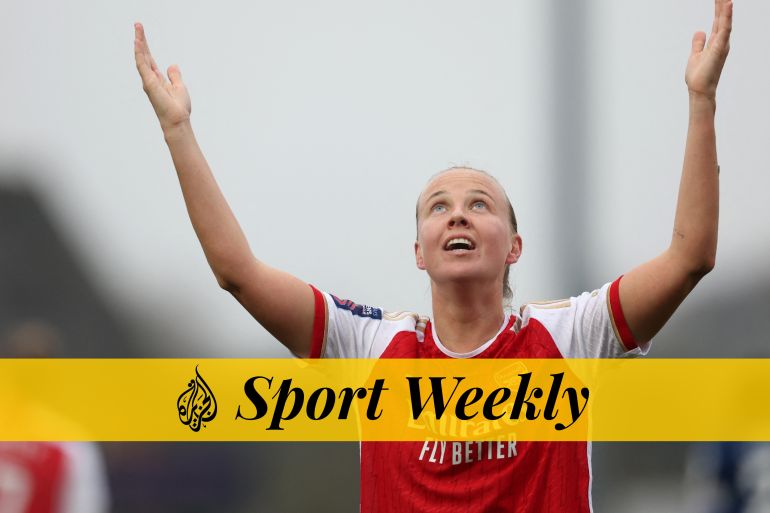Sport Weekly: Inside the plan to revamp English women’s football
This week Al Jazeera covers the impact of ‘NewCo’, surf therapy, and playing football in Robben Island prison.

Welcome to Al Jazeera’s Sport Weekly newsletter, which explores the intersection of sport with politics, culture and money. You can sign up here.
English women’s football is set to enter a lucrative new era from next season as the top two tiers break from the Football Association (FA) and a new company, NewCo, takes over the running of the women’s professional game.
Keep reading
list of 4 itemsJon Rahm jumps ship to LIV Golf in a stunning blow to the PGA Tour
Luis Rubiales ‘forcefully kissed’ England player at Women’s World Cup
Euro 2024 hosts Germany to play Scotland in opening match
Kelly Simmons, former FA director of the women’s game, says the FA wasn’t the right long-term fit to develop the women’s game, which is soaring in popularity – especially after a highly successful World Cup.
“We were concerned that if the women’s leagues just rolled into the men’s Premier League, it would not have sort of the laser focus or an independent voice and might not be the highest priority,” Simmons told Al Jazeera.
“So we [at the FA] all agreed unanimously that the best model would be to set up a new company that has a laser focus, a board and an executive that is solely focused on making the best decisions for the women’s professional game.”
Alex Culvin, a former professional player now heading women’s football strategy and research at FIFPRO players union, says the leagues’ decision to function independently has come at the right time.
“I think, in England, having the independence and the ability to strategically prioritise the growth of the women’s league is something that hasn’t been done before. It’s important, and I’m incredibly excited,” Culvin told Al Jazeera.
The Women’s Super League (WSL) now believes it can become the first billion-pound ($1.24bn) women’s football league in the world within a decade.
WSL clubs will reportedly receive 75 per cent of the combined revenues and have all the voting power on commercial and broadcast matters.
Culvin raised concerns about a power grab by top clubs.
“For me, it is quite problematic because, again, there’s a consolidation of power among the bigger clubs,” Culvin said. “For this new foundation, I think it’s important that there’s no vested interest in providing an undemocratic decision-making amongst clubs.”
Simmons says that revenue sharing further down the pyramid would have to be addressed in the future and that NewCo would still need to work closely with the FA.
“The FA will need to think through how they manage and develop the relationship with the new company to make sure that there’s a joined-up strategy, particularly across things like youth talent, talent development and club development,” she said.
Meanwhile, much about how the governance will operate remains unclear. No financial fair play rules have been announced. Even the name is a placeholder.
So while there is excitement over the potential of the women’s game, it’s tempered by concerns that women’s football could end up replicating some of the stark inequalities and avarice of the men’s game.
Elsewhere this week:
- A way of saying ‘we shall overcome’: Playing football and resisting apartheid on Robben Island.
- Fixing-convicted former Pakistan cricket captain Salman Butt withdrawn as Pakistan Cricket Board consultant.
- ‘It gave me a purpose’: Surf therapy transforms lives in South Africa.